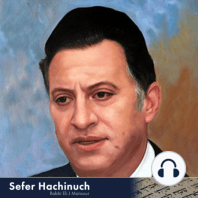20 min listen
Misva #306: Sefirat Ha’omer: To Count The Omer
FromSefer Hachinuch
ratings:
Length:
20 minutes
Released:
Oct 31, 2022
Format:
Podcast episode
Description
After the Torah presents the command to offer the special Omer sacrifice on the 16 th of Nissan (the second day of Pesach), it commands, “You shall count for yourselves…from the day you bring the Omer that is waved; they shall be seven complete weeks” (Vayikra 23:15). This introduces the well-known Misva of Sefirat Ha’omer, which requires counting each day for forty-nine days from the 16 th of Nissan through the day before Shabuot. Elsewhere, in the Book of Debarim (16:9), the Torah commands, “Shiba Shabuot Tispor Lach” – “You shall count for yourself seven weeks.” The Gemara thus establishes that one must count both the days and the weeks. According to some Rishonim, this means that at the conclusion of every seven days, one must make a note of the number of weeks that have passed. On the seventh day, for example, one must count, “Today is seven days, which is one week,” and so on. Others, however, maintain that the weeks must be mentioned every day. Thus, for example, on the 15 th day, one must count, “Today is fifteen days, which are two weeks and one day.” The Sefer Ha’hinuch writes that it is proper to satisfy this second opinion and mention the weeks each day. He adds that this is, indeed, the accepted practice. Even today, this is the view which is followed. In explaining the reason behind this Misva, the Sefer Ha’hinuch makes the powerful statement that “Kol Ikaran Shel Yisrael Eno Ela Ha’Torah” – the essence of the Jewish People is the Torah. He adds that it was for the sake of Torah that the universe came into existence. Moreover, the Sefer Ha’hinuch notes that when G-d appeared to Moshe for the first time, and informed him that He would be bringing Beneh Yisrael out of Egypt, he said, “When you take the nation out of Egypt, you shall serve G-d on this mountain” – referring to Matan Torah at Mount Sinai (Shemot 3:12). This indicates that the primary purpose of the Exodus from Egypt was not the people’s release from slavery, but their receiving the Torah at Mount Sinai and their subsequent fulfillment of the Torah. The Sefer Ha’hinuch goes so far as to say that the people regarded this objective as even more important than their freedom from slavery. In order to express this notion, that the primary purpose of the Exodus was to receive the Torah, we count the days from after the Exodus until Matan Torah, just as somebody counts the days when anticipating something exciting. A servant, for example, counts the days remaining until he attains freedom. By counting the days to Matan Torah, we express our enthusiasm for Torah and how strongly we want to accept it upon ourselves. The Sefer Ha’hinuch then raises the question of why, according to this explanation, we count incrementally from 1 to 49, mentioning how many days have passed, instead of counting backward, from 49 to 1, counting down the number of days of remaining. Normally, when we anticipate some event, we count downward, so we know how many days are remaining. Why, then, does the Torah command us to count the Omer in the reverse fashion, from 1 to 49? The Sefer Ha’hinuch answers that if we would count downward, we would feel disheartened by seeing how many days remain. By counting 49 days until Matan Torah, and then 48, 47, 46 and so on, we would feel distressed by these large numbers. The Torah therefore commanded us to count in the reverse order, from 1 through 49. The Sefer Ha’hinuch adds that one might argue, according to this explanation, that we should count upward during the first half of the Omer period, so as to avoid becoming disheartened, and then, for the remainder of the Omer, count downward, mentioning how many days are left. The Torah did not command us to count this way, the Sefer Ha’hinuch explains, for the simple reason that it would be awkward to change the system of counting in the middle of the Omer period. The Sefer Ha’hinuch writes that the Torah requires beginning the counting on the second day of Pesach, and not on the first day, “for we
Released:
Oct 31, 2022
Format:
Podcast episode
Titles in the series (100)
Misva #19: The Prohibition Against Eating Hametz on Pesach: Daily Sefer Hachinuch - Brought to you by itorah.com by Sefer Hachinuch
